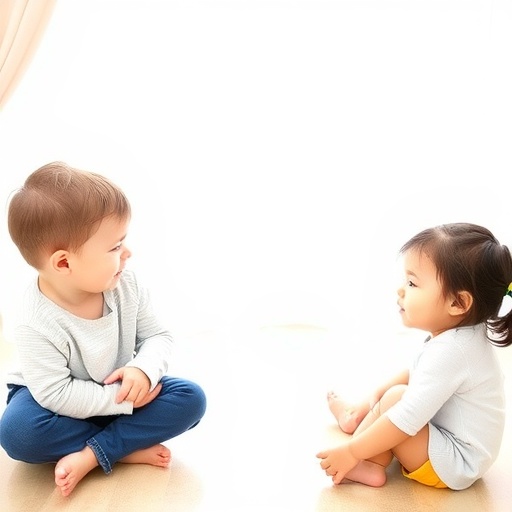Recent research has shed light on an important aspect of childhood development: the interplay between parental psychological distress and children’s social-emotional adjustment. The study investigates how mindful parenting and children’s gratitude can serve as mediators in this relationship. As we increasingly understand the dynamics within family units, this research provides valuable insights that could inform interventions aimed at supporting both parents and children.
In today’s fast-paced world, parents often grapple with various forms of psychological distress, ranging from anxiety to depression. This distress doesn’t occur in isolation; it inevitably impacts children, potentially leading to challenges in their emotional and social development. The findings from the study emphasize the need to address the mental health of parents as a crucial element in fostering healthier family environments.
Mindful parenting is introduced as a possible remedy to counteract the adverse effects of parental distress. Through mindful parenting practices, parents can enhance their emotional presence, reflecting a heightened awareness and sensitivity towards their children’s needs. This approach encourages parents to engage more fully with their children, cultivating not just communication but a deeper emotional connection. The study underscores how adopting mindfulness can transform familial relationships, providing children with the security and support they need to thrive.
Children, in turn, are not passive recipients of their parents’ emotional states. They actively engage in processing these experiences, and gratitude emerges as a significant factor in this dynamic. The research posits that when parents model gratitude and appreciation, children are more likely to develop these traits themselves. In doing so, children can build resilience against the negative impact of their parents’ distress, buffering them from potential emotional turmoil.
Gratitude becomes a double-edged sword in this context. While it serves as a protective factor for children, it is intrinsically linked to the quality of the parent-child relationship. Parents who practice appreciation and express gratitude towards their children can create an environment of positivity, where children feel valued and loved. This nurturing climate can significantly bolster a child’s confidence, allowing them to navigate social settings with greater ease.
The implications of this research are vast. For mental health professionals, understanding the correlation between parental distress, mindful parenting, and children’s gratitude could guide therapeutic interventions. By focusing on enhancing parental mental health and providing tools for mindful engagement, practitioners can help families cultivate healthier dynamics. Furthermore, educational programs could incorporate principles of mindfulness and gratitude into curricula, equipping parents and children with vital coping strategies.
Moreover, the study highlights the importance of support systems for parents. Programs designed to alleviate parental psychological distress not only serve the adults but ultimately benefit children as well. By offering resources like counseling, workshops on mindfulness, and community support groups, society can create a ripple effect that fosters emotional well-being across generations.
While the findings are encouraging, there remain essential questions that warrant further exploration. For instance, how do variations in family structures influence these dynamics? Furthermore, what role does cultural context play in shaping the expression of gratitude and the approach to mindful parenting? Understanding these nuances could lead to more tailored interventions that address the unique needs of diverse families.
As the research community continues to delve into these questions, it becomes increasingly clear that the synergy between parental well-being and children’s social-emotional learning is pivotal. The relationship between parent and child is not merely a backdrop for emotional development; it is an active, dynamic interplay that shapes future generations.
This ongoing investigation into parental psychological distress and its effects on children offers a fresh perspective on family dynamics in modern society. By emphasizing the role of mindful parenting and gratitude, the study opens avenues for holistic approaches to mental health that prioritize the well-being of both parents and children alike.
Emerging evidence points to the possibility that as societal norms shift toward acknowledging and addressing mental health, the outcomes for children can also dramatically improve. The cycle of psychological distress does not have to perpetuate; instead, with the right tools and support, families can break free from these patterns and foster environments where children flourish.
In conclusion, this groundbreaking research contributes to our understanding of the familial factors influencing children’s development. The link between parental psychological distress and children’s emotional adjustment, moderated by mindful parenting and gratitude, invites a comprehensive approach to family health that could ultimately reshape educational and psychological practices across the globe.
As we reflect on these findings, it is essential for policymakers, educators, and mental health practitioners to recognize the interconnectedness of mental health within family systems. A holistic approach that recognizes the roles of both parents and children is crucial for fostering resilience and emotional intelligence in future generations.
Maintaining a focus on these dynamics not only enriches the academic discourse surrounding psychological health but also emphasizes the practical implications for family-oriented programs aimed at improving the well-being of parents and children collectively.
By investing in our understanding of how to nurture this vital connection, society can pave the way for a brighter future, where children can thrive amidst the challenges posed by parental distress and emerge with the emotional fortitude necessary for lifelong success.
The path ahead is both challenging and promising, demanding continuous dialogue and research to inform practices that support families in navigating their emotional landscapes, ensuring that children are equipped to develop their social-emotional competencies effectively.
Subject of Research: The interplay between parental psychological distress and children’s social-emotional adjustment, with a focus on mindful parenting and children’s gratitude as mediators.
Article Title: Parental Psychological Distress and Children’s Social Emotional Adjustment: Mindful Parenting and Children’s Gratitude as Mediators.
Article References:
Zeng, XY., Wu, Xy., Lau, E.Y.H. et al. Parental Psychological Distress and Children’s Social Emotional Adjustment: Mindful Parenting and Children’s Gratitude as Mediators.
IJEC (2025). https://doi.org/10.1007/s13158-025-00444-2
Image Credits: AI Generated
DOI: 10.1007/s13158-025-00444-2
Keywords: Parental psychological distress, children’s social-emotional adjustment, mindful parenting, gratitude, family dynamics, emotional resilience.




